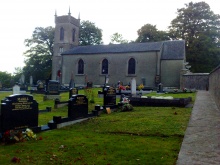St Marks, Aghadrumsee: Difference between revisions
| Line 141: | Line 141: | ||
Image:Aghadrumseechurch.jpg|St. Marks - Outside looking up from the graveyard turn style | Image:Aghadrumseechurch.jpg|St. Marks - Outside looking up from the graveyard turn style | ||
Image:Aghadrumseechurchdoor.jpg|St. Marks - Front door | Image:Aghadrumseechurchdoor.jpg|St. Marks - Front door | ||
Image:Aghadrumseechurchdoorplate.jpg|St. Marks - "To the Glory of God - AD 1820" | |||
</gallery> | </gallery> | ||
Revision as of 12:46, 4 November 2010
| St Mark's, Aghadrumsee | |
 | |
| Country | Northern Ireland |
|---|---|
| Denomination | Church of Ireland |
| Clergy | |
| Rector | Edd Kille |
About
St. Marks Church and graveyard are located in the townland of Aghadrumsee.
History
The deed to grant the ground for the church and cemetery is dated 1st May, 1817. The petition to consecrate the church is dated 19th August 1824 and the actual ceremony took place the next day. The stone above the door reads "To the Glory of God 1820".
The Ecclesiastical Commissioners Report of 1836 states the church was erected in 1819 as a chapel of ease for Clones so it may be that the building was actually in use in 1820 or perhaps that was when the building got under way. The church was extended between 1834 and 1865 probably to include the present chancel. Up to 1872 there was no resident rector, the parish being administered as part of Clones parish. In that year, the select vestry, meeting in the school-house, were authorised to advertise for a Rector.
St. Mark's churchyard contains the unmarked grave of Charles Irwin V.C.
List of Rectors
- Rev. A. Rea 1873-1875
- Rev. R. Moffatt 1875-1880
- Rev. G. Sullivan 1881-1914
- Rev. W. Stack 1914-1916
- Rev. L. Eccles 1916-1918
- Rev. E. Ward 1918
- Canon A.H. McCombe
- Rev. W.W.Nash
- Canon Edd Kille
The Rectory
The Rectory was sold to the Johnston family who now reside there.
Present Day
The parish was grouped with Clogh and Drumsnatt with Canon Edd Kille as rector.
Photographs
-
St. Marks - Inside looking towards the altar
-
St. Marks - Outside looking up from the graveyard turn style
-
St. Marks - Front door
-
St. Marks - "To the Glory of God - AD 1820"
Some Questions
When was the former Rectory built? Who built it?
Where were people buried before the graveyard was available?
When was the schoolhouse built?
How was the money raised for these products?
Where did the materials come from?
Was the now demolished mill at Killyfole there before the church and school-house?



